The Delaware Dispensary Market Just Opened. Here's How to Outmarket the Rest.
The Delaware Dispensary Market Just Opened. Here's How to Outmarket the Rest.

Insights | 2025-08-08
Eric Allred - Head of Product

Winning one of Delaware's first adult-use cannabis licenses is no small feat. You've earned a seat at the table in a state with limited licenses and a tightly managed rollout.
As opening day quietly approaches, you notice a slight nuance in the market; the established medical dispensaries have a built-in customer base, and you're starting from zero.
While it might seem unfair, you've done the hard work: navigating compliance, stocking quality inventory, assembling the right team, and ensuring your store is where people want to shop. The only missing piece? The customers are not walking through the door.
Finding success in a burgeoning market isn't about having the "best" product or the "perfect" location. It's about establishing visibility and a frequency in a market where advertising options are limited, competition will only grow with time, and consumers may still be figuring out what adult-use cannabis even looks like.
We've seen the pattern from working with dispensaries in other new markets (we are looking at you, Minnesota). Operators who win aren't always the biggest or the most connected; instead, they're the ones who know their customers, play by the rules without letting those rules box them in, and build systems that consistently attract and keep shoppers coming back.
This guide walks you through how to work within Delaware's regulations, set up a marketing foundation before the field gets crowded, and implement customer acquisition and retention strategies that can scale as the market evolves.
Key Takeaways
- Understand Delaware's market dynamics to seize early advantage in a rollout starting with just 13 converted medical dispensaries.
- Navigate strict ad rules using compliant digital channels, educational content, and community-focused marketing.
- Build marketing systems to stay ahead when 30 more licenses enter 2025–2026.
- Leverage tourism traffic with targeted, age-verified campaigns for locals and visitors.
- Set KPIs and budgets that factor in the 15% excise tax and limited ad space.
- Prioritize education and relationships to win over first-time adult-use buyers.
- Design scalable systems ready to adapt as rules and competition change.
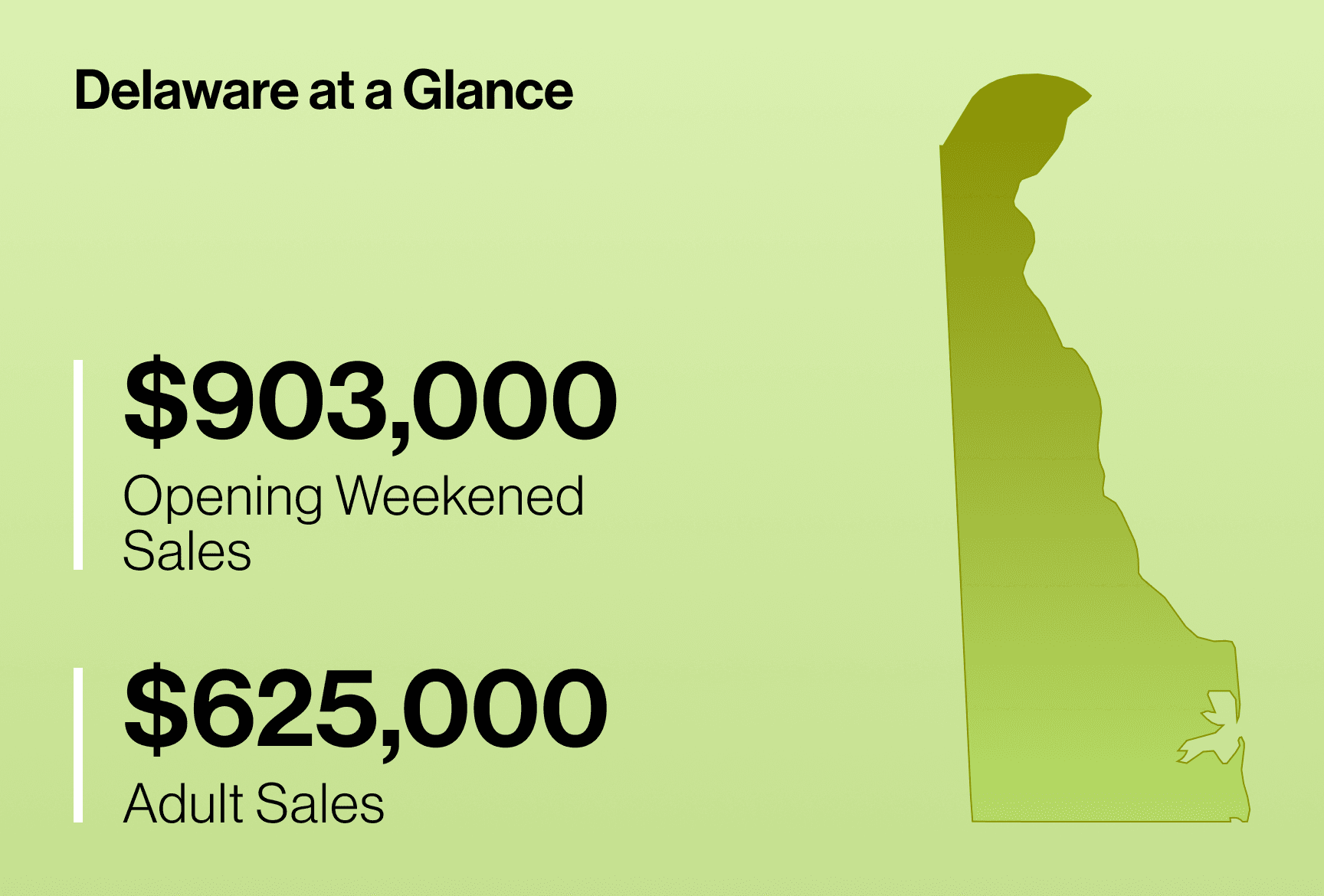
Understanding the Delaware Cannabis Marketing Landscape
Delaware's adult-use market is still brand new, but regulators have already set the game's rules. If you know them, you can use them to your advantage.
Working Within Delaware's Regulatory Framework
Regulatory oversight shapes every move you make.
The Office of the Marijuana Commissioner (OMC) runs Delaware's adult-use program, overseeing licensing, compliance, and enforcement. Right now, only converted medical dispensaries can sell adult-use cannabis. Still, additional retail, cultivation, and manufacturing licenses will be phased in. Before more players enter, that short window is your chance to lock in market share.
Advertising rules require precision, not volume.
State law bans anything that appeals to minors or is visible from public spaces, meaning billboards, mass media, and eye-catching storefront displays are off the table. Your best moves will be digital: your website, email, SMS, and carefully targeted online ads with a measured approach to age gating. It's less about blasting your message and more about getting it to the right people, at the right time, and in the right way.
Taxes influence buying decisions.
Adult-use sales come with a 15% excise tax over retail prices. Medical patients are exempt, but recreational customers can be pushed toward deals or even across state lines by that extra cost (we've seen Michigan be a beneficiary of cross-border sales). Bundles, loyalty rewards, and value-driven promotions will help your customers within the borders.
Competitive Landscape in Delaware
Limited licenses create breathing room, but only for now.
At launch, Delaware's adult-use market had just 13 dispensaries, including The Cannabist Co. (Columbia Care), Thrive Dispensaries, Fresh Cannabis, The Farm, and Field Supply. With so few players, there's a real opportunity to stand out and own your local market.
The next wave will bring serious competition.
The OMC will issue 30 additional conditional retail licenses over 2025–2026 and more cultivation and manufacturing permits. That means more brands, marketing noise, and price competition, all reasons to cement your presence early.
Early movers can claim lasting market share.
Build brand recognition, customer loyalty, and strong community ties before the new licenses open. More consumer options will make it increasingly difficult to defend your position when additional stores come online. Waiting until competition arrives to build awareness is a recipe for playing catch-up.
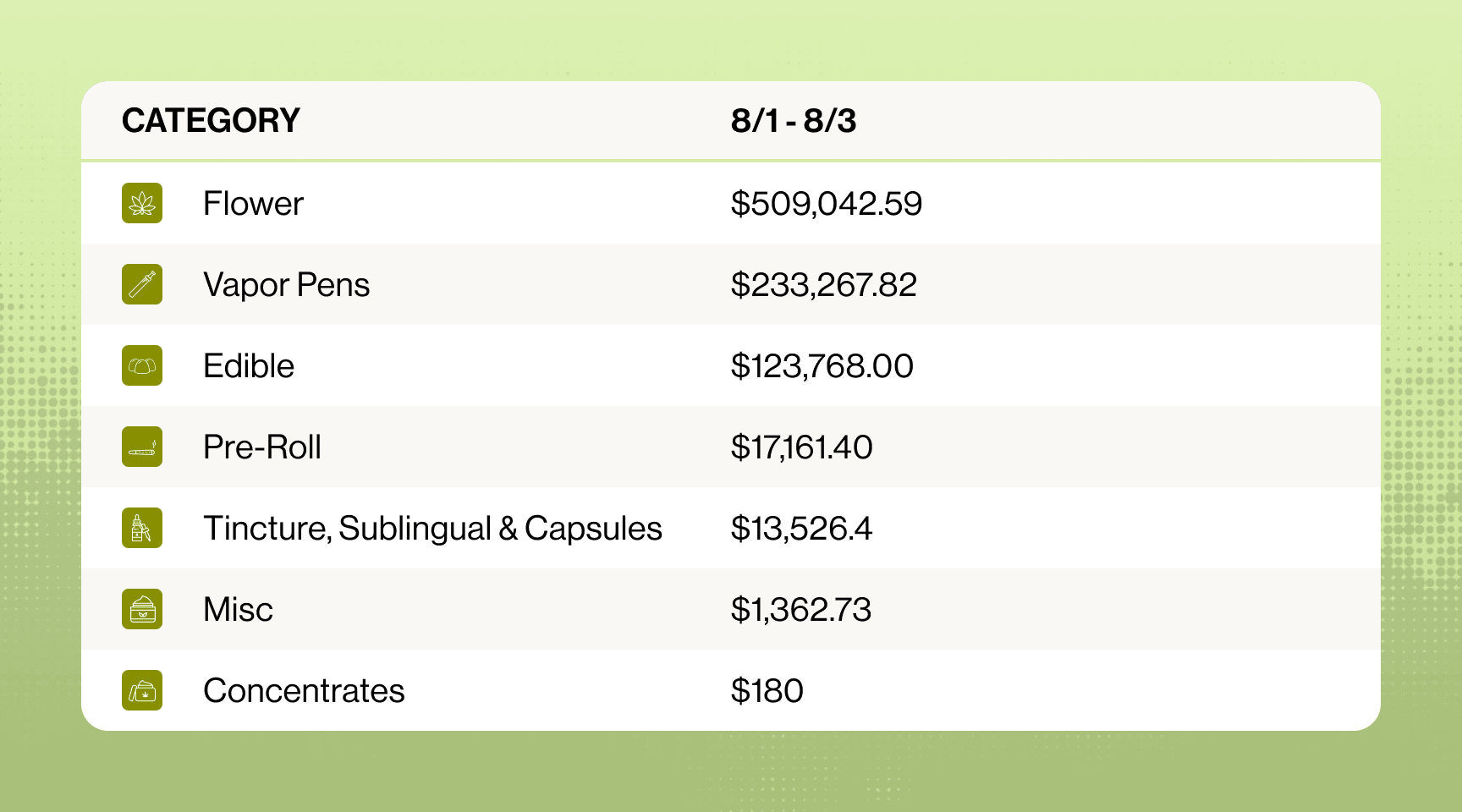
Consumer Trends and Market Projections in Delaware
If you want your marketing to land, you must understand who's walking through your doors and what they're looking for. Delaware's adult-use market may be young, but the early numbers and national trends clearly show how to stock, price, and promote.
Tourism and local shoppers drive a mixed customer base.
The first wave of adult-use buyers consists of medical patients, curious first-timers, and visitors from nearby cities. Delaware's location between Philadelphia, Baltimore, and D.C. means your marketing must speak to residents and tourists year-round.
Flower dominates early sales, but variety wins loyalty.
Opening weekend data showed that more than half of the sales were flower, followed by vape carts and edibles. Nationally, inhalables still lead, but edibles are gaining ground. A balanced menu engages daily buyers and "occasional treat" shoppers.
Pricing and product availability shape repeat visits.
With the 15% excise tax making prices higher than in some neighboring states, customers quickly notice the value. A consistent stock of popular strains, transparent potency information, and bundling deals to communicate value to customers give shoppers a reason to return.
Loyalty programs accelerate word-of-mouth growth.
Limited competition at launch creates a rare chance to turn first-time buyers into regulars. Personalized offers, rewards programs, and exceptional service will keep customers and drive referrals in a market where good experiences travel fast.
Building Your Delaware Cannabis Marketing Plan
Most dispensary marketing plans fail because they prioritize tactics over strategy. When operators jump headfirst into social media, loyalty programs, and paid advertising without establishing clear objectives and measurement frameworks, they waste limited resources and create the illusion of progress without meaningful results.
Minnesota's emerging market requires a foundation-first approach. The goal is to build sustainable, relative advantages in the early innings. It's better to have something and not need it than to need something and not have it.
Setting Clear Objectives & Dispensary KPIs
Your data tells a story. We developed BNCHMRK, a dataset of key dispensary KPIs, to assist owners, operators, and marketing leaders better understand their marketing efforts' efficacy by examining a confluence of store-level, order-level, and loyalty-based metrics.
The nine key KPIs connect marketing activities with the income statement and help govern channel-related activity. By leveraging our proprietary BNCHMRK dataset, you can develop an understanding of how various channel-specific KPIs collectively contribute to broader, overall order—and store-level performance.
Store-Level Metrics
Store-level metrics focus on overall business health and performance:
- Marketing Efficiency Ratio (MER): Measures total revenue generated per marketing dollar spent.
- Acquisition Marketing Efficiency Ratio (aMER): Evaluates revenue specifically attributable to new customer acquisition relative to marketing spend.
Order-Level Metrics
Order-level metrics analyze individual customer transactions:
- Cost Per Order (CPO): Tracks marketing spend efficiency per transaction.
- Customer Return Rate: Highlights the proportion of customers making repeat purchases, indicating marketing's effectiveness in driving ongoing customer engagement.
Loyalty & Retention Metrics
Loyalty-based metrics evaluate customer retention and long-term value:
- Customer Review Rate: Indicates the percentage of customers leaving reviews, reflecting engagement and satisfaction.
- New Customer Review Rate: Specifically measures engagement among new customers.
- Loyalty Program Opt-In Rate: Measures how effectively customers enroll in loyalty programs.
- New Customer Loyalty Opt-In: Evaluates initial engagement by new customers with loyalty programs.
- Marketing Opt-In Rate: Assesses the success of customer consent to marketing communications, highlighting potential for ongoing relationship building.
Budgeting & Resource Allocation
Your marketing budget should reflect your dispensary's business stage, competitive landscape, and specific business objectives. Aligning your marketing spend with clear KPIs ensures efficient resource use and maximum ROI.
Creating Your Dispensary's Marketing Budget
Creating an adequate marketing budget requires assessing three key factors:
- Business Stage: Are you launching, growing, or mature?
- Market Competitiveness: Is your dispensary in a densely competitive urban area or a more rural, less competitive market?
- Revenue Levels: Established dispensaries allocate around 1–2% of topline revenue to marketing. Newer dispensaries or those in competitive markets may need to allocate more.
Allocating Your Budget
Strategically distribute your budget to balance foundational growth with targeted expansion:
Foundational Channels
- Website & SEO (30–40%): Optimize for local searches, ensure intuitive navigation, and prioritize mobile responsiveness.
- Email & SMS Marketing (15–20%): Build an engaged subscriber list to drive repeat visits through personalized communication.
- Local Awareness (15–20%): Invest in local events, promotions, and community engagement.
Growth Channels
- Paid Advertising: Introduce targeted paid search, social media ads, and cannabis-specific platforms incrementally, scaling based on results.
- Loyalty & Retention: Expand loyalty programs, personalized incentives, and referral campaigns for high-ROI customer retention.
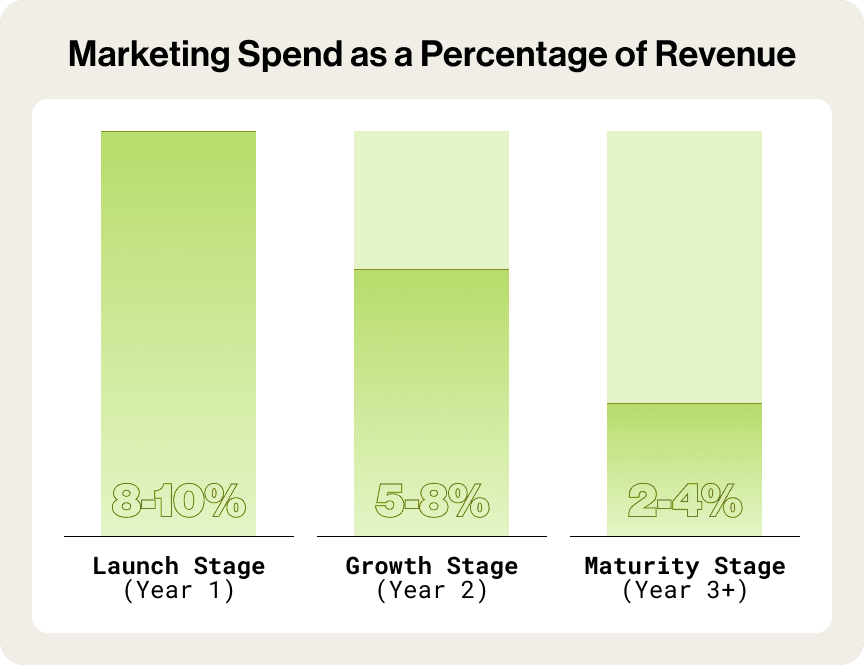
Budget Variations by Stage
Launch Stage (Year 1)
Marketing Spend: 8–10% of revenue
Focus on foundational efforts: website setup, SEO, initial customer acquisition, and establishing local brand presence.
Growth Stage (Year 2)
Marketing Spend: 5–8% of revenue
Expand paid advertising, increase SEO efforts, enhance content creation, and prioritize loyalty and retention programs.
Maturity Stage (Year 3+)
Marketing Spend: 2–4% of revenue
Refine loyalty initiatives, selectively leverage paid advertising, and focus on maximizing customer lifetime value.
Aligning your marketing budget to your dispensary's lifecycle and market realities ensures sustainable growth, optimized ROI, and lasting success.
Choosing Technology Vendors That Power Marketing Success
This market is still finding its footing, and the regulations will change as it matures. Your technology vendors must adapt quickly while keeping you compliant with state tracking requirements and advertising restrictions.
Selecting your online menu & POS system.
Your POS has to do more than process transactions; it must integrate with Delaware's seed-to-sale tracking and support compliant e-commerce. Look for:
- Real-time inventory sync between in-store terminals and online menus so customers see what's available.
- Built-in age verification on the POS and website to meet Delaware's advertising compliance rules.
- Detailed analytics on purchase patterns, product performance, and peak shopping times to guide both marketing and inventory planning.
Choose vendors with multi-state experience who understand cannabis compliance and can update systems as Delaware's rules evolve.
Choosing a cannabis-focused CRM.
In a small market like Delaware, managing relationships is the long game. Your CRM should allow:
- Segmentation by local vs. tourist, purchase history, and product preferences.
- Automated campaigns for customer education, loyalty program management, and retention.
- Loyalty integration that rewards repeat visits while following Delaware's prohibition on giving away cannabis products.
Integration and compliance should be non-negotiable.
Your cannabis CRM, POS, and online menu should work together in real time to align your data and customer experience. The vendors should provide compliance features like age verification prompts, required health warnings, and tracking to reduce admin work and keep you on the right side of the law.
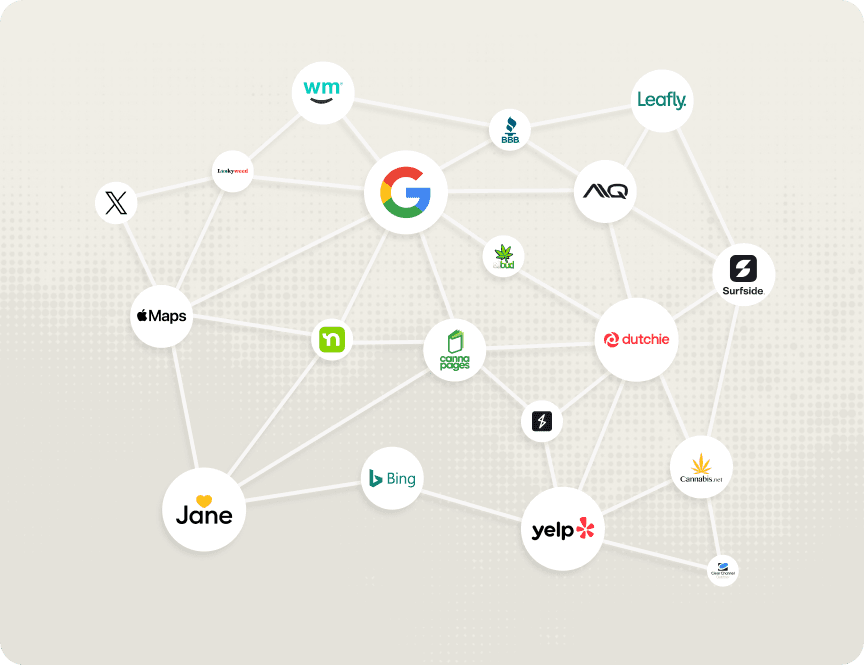
Implementing Your Dispensary Marketing Strategy
Success here means finding ways for your marketing channels to reinforce each other while staying within the state's advertising restrictions.
Each piece: your website, local SEO, email and SMS, and paid ads, needs to be optimized independently, but the magic happens when they integrate and work interoperably as part of a comprehensive customer journey.
Website Design & Development – Your digital storefront.
- Age verification and compliance come first. Delaware requires age-gating for all cannabis content and health warnings on every page. Your site should verify visitors are 21+ before they see menus, product info, or promotions.
- Educational content builds trust. Offer resources on cannabis basics, product types, dosing, and Delaware-specific regulations. Position yourself as the go-to guide for new adult-use customers without making prohibited health claims.
- Real-time inventory avoids frustration. Sync your POS to show accurate product availability, pricing (including the 15% excise tax), and detailed descriptions. Enable online ordering for pickup to shorten wait times and improve the experience.
- Local SEO makes you discoverable. Optimize for Delaware searches like "Wilmington dispensary" or "Dover cannabis." Create content that ties your brand to local communities and tourism hubs.
Local SEO – How customers find you.
- Google Business Profile optimization drives visibility. Keep hours accurate, post high-quality photos, use detailed descriptions, and post regularly about products, events, and education. Respond to every review to show you're engaged.
- Local citations build credibility. Ensure your name, address, and phone number match across directories, including Weedmaps, Leafly, and Delaware tourism sites.
- Community connections create backlinks. Partner with local media, tourism boards, and event organizers to earn links that boost your rankings.
- Content strategy targets Delaware audiences. Blog about state cannabis laws, community work, and educational topics for residents and visitors.
Email & SMS Marketing – Building direct relationships.
- Segmentation increases relevance. Create separate campaigns for locals, tourists, and medical patients transitioning to adult-use.
- Educational automation nurtures customers. Build a welcome series for new sign-ups that teaches product types, responsible use, and Delaware-specific rules.
- Compliance keeps you in business. Use platforms verifying age, storing consent logs, and including health warnings in every message. Make opt-outs simple and respect preferences.
- Personalization drives engagement. Use purchase history and preferences to recommend products, share relevant education, and send compliant promotions.
Paid Advertising – Navigating restrictions.
- Cannabis-specific ad networks open doors. Work with platforms built for cannabis businesses that handle age verification and audience targeting.
- Geofencing taps into tourist dollars. Target adults visiting beach towns, hotels, and major attractions with location-based ads that meet Delaware's compliance rules.
- Content marketing educates and builds trust. Partner with local bloggers, influencers, and publishers with adult audiences to share educational, compliant content.
- Event sponsorships strengthen community ties. Support adult-focused festivals, markets, or community events where the audience meets the state's age requirement.
Delaware Dispensary Marketing FAQs
Can dispensaries advertise in Delaware?
Yes, but the rules are strict. You can market through digital channels with age verification, sponsor events where at least 85% of the audience is 21+, and create educational content with the required health warnings. Billboards, radio, TV, and mass-transit ads are prohibited, and every campaign must follow detailed compliance measures.
Are dispensaries in Delaware profitable?
They can be. Limited competition and controlled market entry create favorable conditions, but profitability hinges on efficient customer acquisition and strong retention. The 15% excise tax and compliance costs mean tight margins, so operational discipline and loyalty programs matter more than volume alone.
How much does a dispensary owner in Delaware make?
Earnings typically range from $150,000 to $350,000 annually, with top performers reaching $500,000+ as the market matures. Your actual number will depend on location, efficiency, marketing effectiveness, and customer service — in a smaller market like Delaware, repeat business drives the bulk of revenue.
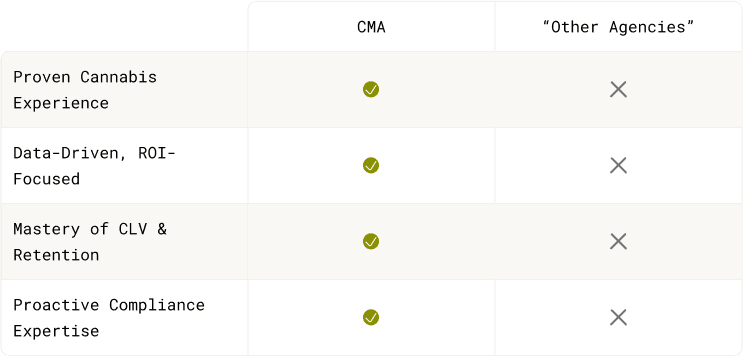
Working with Cannabis Marketing Professionals
Delaware's emerging market and complex regulations create unique challenges that general marketing agencies cannot adequately address.
The state's advertising restrictions, small customer base, and evolving compliance requirements demand specialized knowledge and cannabis-specific experience.
If you decide to work with a Delaware Cannabis Marketing Agency, here are a few things to remember:
- Prioritize proven cannabis experience. When evaluating potential partners, it’s essential to understand precisely what a cannabis marketing company does and whether it's worth the investment, ensuring you choose an agency aligned with your dispensary’s unique goals.
- Demand compliance-first strategies. Your agency should know Delaware's regulations better than most operators, with built-in processes to prevent violations before they happen. Compliance should be part of the creative process, not an afterthought.
- Match the market's culture. Delaware is a small state where community relationships matter. Your marketing partner should understand how to build genuine local connections instead of relying solely on broad, impersonal tactics.
- Require precise measurement and ROI tracking. Insist on KPI tracking, CAC (customer acquisition cost) monitoring, and ROI reporting specific to cannabis. In Delaware's environment, your agency needs to be nimble and able to adjust based on performance data.
Moving Forward with Marketing Your Delaware Dispensary
Start with compliance and strong foundations.
Build your marketing on a compliant website, customer education programs, and integrated tech supporting today's operations and future growth. Delaware's rules make these essentials more valuable than flashy campaigns.
Know your primary challenge.
Determine if your biggest hurdle is building awareness, converting visitors into loyal customers, or scaling as competitors enter. That clarity will drive more intelligent resource allocation.
Build adaptable, data-driven systems.
Track KPIs from day one, collect customer data, and design marketing systems that can pivot as regulations and competition evolve.
Focus on relationships over transactions.
Delaware's size rewards operators who build real community ties. The dispensaries that thrive will be the ones that see customers as long-term relationships, not just one-time sales.
About The Cannabis Marketing Agency
The Cannabis Marketing Agency: Cannabis marketing experts making your dispensary the one everyone talks about (in a good way).
We make your dispensary the local favorite — the spot people talk about, shop at, and keep coming back to.
+4 Years Growing Dispensaries: We don't "learn on your dime".
Trusted by Dispensaries in 18 Markets: From Cali to Mass, if it’s legal, we’ll help you win.
For DIYers who hate learning the hard way.
Want More Dispensary Customers?
We grow dispensaries like it’s our day job (because it is). Ever wonder what we’d do for yours? Let’s find out.
Get Started